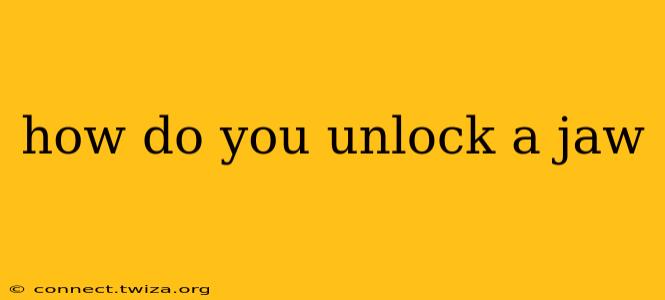How Do You Unlock a Jaw? Understanding Temporomandibular Joint (TMJ) Dysfunction
The phrase "unlock a jaw" usually refers to experiencing temporomandibular joint (TMJ) dysfunction, a condition affecting the jaw joint and surrounding muscles. It's not about literally unlocking something with a key, but rather alleviating symptoms that cause the jaw to feel stiff, locked, or limited in movement. Let's explore this further.
What Causes a "Locked" Jaw Feeling?
Several factors can contribute to the sensation of a locked jaw, often associated with TMJ disorders:
- Muscle spasms: Tight or spasming muscles surrounding the jaw can restrict its movement, creating a feeling of being locked. Stress, clenching or grinding teeth (bruxism), and even poor posture can trigger these spasms.
- Dislocation: In more severe cases, the jaw joint can actually dislocate, resulting in a visibly misaligned jaw and significant pain and limitation of movement. This requires immediate medical attention.
- Arthritis: Degenerative conditions like osteoarthritis can affect the TMJ, causing inflammation, pain, and restricted movement.
- Injury: A blow to the jaw or a fracture can lead to locking or limited movement.
- Infections: Infections in or around the TMJ can cause inflammation and pain, mimicking a locked jaw.
How to Address a "Locked" Jaw Feeling
The best approach depends on the underlying cause. Self-treatments are generally only suitable for mild cases of muscle tension. Always consult a doctor or dentist if you experience severe pain, locking, or swelling. They can properly diagnose the issue and recommend the most appropriate course of action.
Here are some potential strategies for managing mild TMJ symptoms:
- Gentle jaw exercises: Specific stretches and exercises can help relax the jaw muscles and improve range of motion. These should be done under the guidance of a healthcare professional to avoid further injury. Examples include opening and closing your mouth slowly, gently moving your jaw from side to side, and gently pressing your tongue against the roof of your mouth.
- Heat or cold packs: Applying heat or cold packs to the affected area can help reduce inflammation and pain. Experiment to see which works best for you.
- Over-the-counter pain relievers: Medications like ibuprofen or acetaminophen can help manage pain and inflammation.
- Stress management techniques: Stress significantly contributes to TMJ dysfunction. Relaxation techniques like yoga, meditation, or deep breathing exercises can be beneficial.
- Dietary changes: Avoiding hard-to-chew foods can reduce strain on the jaw joint.
Can I unlock my jaw myself?
For mild cases stemming from muscle tension, some gentle self-massage and jaw exercises might provide temporary relief. However, attempting to forcefully manipulate your jaw can worsen the problem and potentially cause further injury. Do not attempt to forcefully “unlock” your jaw yourself.
What are the long-term effects of an unlocked jaw?
The long-term effects depend on the underlying cause and its management. Untreated TMJ disorders can lead to chronic pain, difficulty eating and speaking, and even permanent jaw misalignment. Early diagnosis and treatment are crucial to prevent these complications.
When should I see a doctor for a locked jaw?
Seek immediate medical attention if you experience:
- Severe pain
- Inability to open your mouth
- Swelling around the jaw
- Jaw misalignment
- Significant clicking or popping in your jaw
- Symptoms that persist for more than a few days
Remember, this information is for general knowledge and does not constitute medical advice. Always consult with a healthcare professional for diagnosis and treatment of TMJ disorders or any jaw-related issues.
